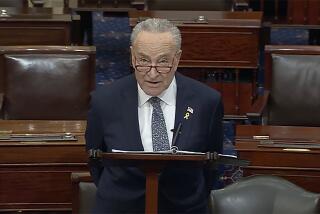No Value in N.Y. Talks on Mideast, Shamir Says
- Share via
JERUSALEM — Prime Minister Yitzhak Shamir on Thursday dismissed as without “special value” Middle East peace talks scheduled for later this month involving President Reagan and the foreign ministers of Israel and Egypt.
At the same time, Cabinet members of Shamir’s Likud Bloc made plans to formally prevent Foreign Minister Shimon Peres from making any substantive agreements in the talks, expected to take place Sept. 26 in New York.
Shamir and Likud are locked in a heated electoral battle with Peres and his centrist Labor Alignment. Likud officials have charged openly that the New York meeting, reportedly to take place at the behest of U.S. Secretary of State George P. Shultz, is designed to raise the stature of Peres in the eyes of Israeli voters.
General elections are scheduled here Nov. 1 and may end four years of an increasingly tenuous unity government composed of Likud and Labor ministers.
Shamir has stopped short of accusing the Reagan Administration of interfering in the Israeli elections, but he took pains Thursday to characterize the talks as essentially meaningless.
The ‘Twilight Hour’
“We all know that one meeting is incapable of producing any radical changes, especially when it comes at the twilight hour just before elections in the United States and Israel,” he said. “I don’t think it is possible to give any special value to such a meeting within the context of the peace process.”
The Likud Cabinet members will meet with Shamir today to propose that the full Cabinet deny Peres a mandate to negotiate seriously in New York. The Cabinet meets Sunday.
“The whole thing is so obvious,” Likud member Yitzhak Modai told an Israeli radio station. “It’s an election gimmick. It is unacceptable in the democratic world to involve foreign factors in domestic elections.”
Wednesday’s surprise announcement of the New York meeting raised no special hope here of ending the conflict between Israel and Palestinians in the occupied West Bank and Gaza Strip. For nine months, Arabs in the occupied territories, which Israel took in the 1967 Arab-Israeli War, have waged an uprising with rocks and gasoline bombs against Israeli soldiers and settlers.
Associates of Foreign Minister Peres speak only of vague ideas to be exchanged at the three-way meeting in New York.
‘We Hope to Achieve Peace’
“Ideas are important,” Alon Liel, a spokesman for Peres, said. “We hope to achieve peace. That doesn’t mean something will happen in the next two months.”
Reagan, Peres and Egypt’s Foreign Minister Esmat Abdel Meguid will all be in New York for the opening of the U.N. General Assembly. Officials in Washington said Thursday that Reagan will also meet with top officials of other nations who will be in New York for the Assembly sessions.
Israeli sources said Shultz proposed the New York meeting to Moshe Arad, the Israeli ambassador to the United States, last month in New Orleans, where both had gone for the Republican national convention.
Sources in the Israeli Foreign Ministry said the three officials will try to revive a Shultz plan to convene an international peace conference on the Middle East. The conference would include direct talks between Israel and a joint Jordanian-Palestinian delegation.
Peres fits into Shultz’s peace proposal because he is willing to attend an international conference and because he accepts the concept of giving up part of the occupied lands in exchange for peace with Arab countries.
Private Meeting in London
Peres’ policy had long rested on the assumption that King Hussein of Jordan would be willing to talk peace, but Hussein pulled out of the process in July. Peres met privately with Hussein in London in April, but a deadlock in the Israeli Cabinet blocked him from getting official peace talks going.
Shamir on the other hand insists on retaining Israeli control of all the territories taken in the 1967 war, and he wants neighboring Arab countries to negotiate peace directly with Israel. Shultz traveled to Israel several times this spring and summer in an effort to interest Shamir in his peace talk proposal, but Shamir refused to budge.
Egypt, meanwhile, is publicly attaching little importance to the New York meeting. Officials in Cairo said the talks will emphasize Israeli-Egyptian differences over Taba, a disputed speck of Sinai desert beach at the southern extreme of Israel. Arbitrators in Geneva are expected to rule by the end of the month on whether Taba is Israel’s or Egypt’s.
Egypt signed a peace treaty with Israel a decade ago.
More to Read
Sign up for Essential California
The most important California stories and recommendations in your inbox every morning.
You may occasionally receive promotional content from the Los Angeles Times.










